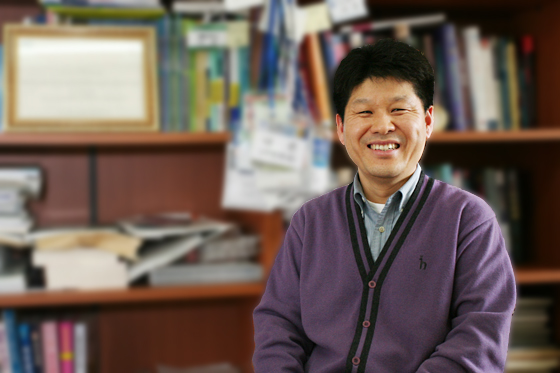-
Development of material to improve cancer diagnosis and treatment endoscopyAuthor : Prof. Na GeonDate : 2019.03.13Hit : 477
-

Development of material to improve cancer diagnosis and treatment endoscopy
A research team led by Professor Na Geon (major in biotechnology) of the Catholic University of Korea has developed a material that improves endoscopy diagnosis and enhances treatment for digestive system cancer, using materials from chemical reactions caused by light.
Professor Park Woo-ram of Cha University collaborated with Professor Na Geon in this project. The research is characterized by the fact that it improved the accuracy of cancer diagnosis and treatment effectiveness by compensating for the shortcomings of the original cancer identification method of checking the height difference between cancerous tissues and normal ones via endoscopy, which were hampered by ▲inaccurate diagnosis and ▲overdependence on doctor’s experience.
The newly developed material, consisting of “aptamer” that adheres to cancer and a photoreactor that treats cancer, utilizes “nucleolin,” a major component of cancer cells that adheres to protein. Nucleolin treats cancer through a photoreactive agent, which generates active oxygen when exposed to a certain wavelength of light. The research team confirmed that there had been an innovative breakthrough in the diagnosis and treatment of colorectal and peritoneal metastatic cancers.
Professor Na Geon explained that, “The newly developed material can be extensively used for treating almost all cancers detectable through endoscopy and laparoscope. In particular, we expect it would be of great help in checking for the peritoneal transition of cancer in terminally ill patients.”
This research was supported by the Ministry of Science and ICT and Basic Research Projects of the Korea Research Foundation. The research performances have been published in <Advanced Functional Materials>, an international academic journal, on February 18th.CRCiD selected as the “2018 Healthcare R&D Excellence 20” by the Korea Health and Industry Promotion Agency
Professor Cho Mi-ra(Catholic Rheumatic Research Center) Professor Kim Yong-gu(Dept. of Diagnostic Examination, the Catholic University of Korea, St. Mary’s Hospital) Two research projects of the Catholic University of Korea, St. Mary’s Hospital Leading Immune Disease Convergence Research Unit(CRCiD), Leader: Professor Yang Cheol-woo, Nephrology department, St. Mary’s Hospital, Project No.: HI14C3417) have been selected for the “2018 Healthcare R&D Excellence 20.”
The Korea Health and Industry Promotion Agency and the Ministry of Health and Welfare co-published the “2018 Healthcare R&D Excellence Case Study Collection” on January 7th based on committee evaluation on projects that demonstrated outstanding research results for the past year. The CRCiD succeeded in the commercialization of immunodeficiency drugs and diagnostic devices and has been recognized for its excellence, based on the countless R&D research projects of the Ministry of Health and Welfare.
Professor Cho Mi-ra’s project, a joint research effort with the team led by Professor Cho Yoon-seok of Hanlim Pharmaceuticals, was focused on the development of a new immunomodulator to sustain and control immune homeostasis. It was designed to improve the side effects of existing immunosuppressants. Currently, clinical trials are underway based on the research results.
Professor Kim Yong-gu’s project targeted the diagnosis, prognosis determination, and post-treatment traces of residual disease of mutant genes causing blood tumors. His project was selected because the research results were listed as new medical technology and became clinically applicable.
The Leading Immune Disease Convergence Unit of St. Mary’s Hospital, where professors Cho and Kim are conducting research, is a representative R&D project at the Catholic University of Korea in the health and medical research field. The university aims to enter the clinical trial of world-class products and medical technologies by building joint research partnerships among industry, school, research institutes, and hospitals.
Particularly, the unit has been endeavoring to develop new medicine and medical devices by winning research funds for immune diseases (transplantation and autoimmune disease) for the past decade since 2009. As a result, it listed 6 clinical trials and 8 new medical technologies.
Unit Leader Professor Yang Cheol-woo said, “2 of our units have been selected as Top 2 excellence case studies, and the CRCiD will continue to bring impressive results based on R&D investment by the government.” He added, “with continued support through government R&D policies, such achievements would lead to commercialization. We will actively work to establish a globally competitive immunodeficiency hospital in Korea's health and medical sector.”
-
Attachment File

